|
Stone Street
Stanford
01303 812125
http://www.thedruminn.com/
https://whatpub.com/drum-inn
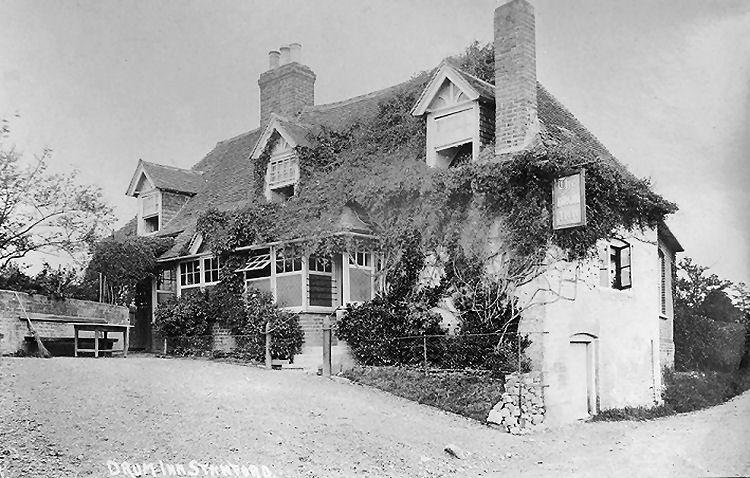
Above postcard 1905, kindly sent by Rory Kehoe. |
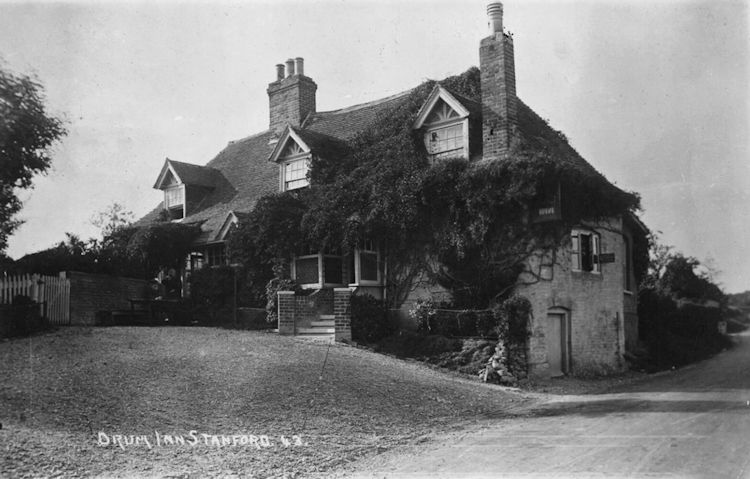
Above postcard circa 1914, kindly sent by Rory Kehoe.
At the time this photograph was taken, the Drum was a tied house within
the estate of Alfred Leney's Phoenix Brewery, Dover. |
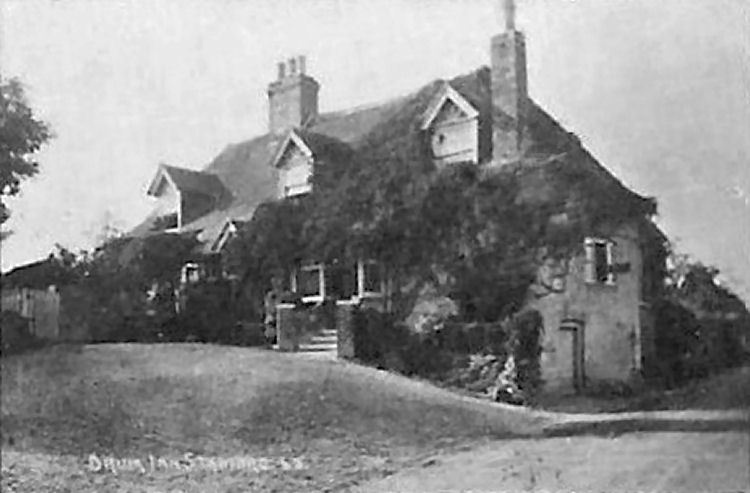
Above postcard 1920, kindly sent by Rory Kehoe. |
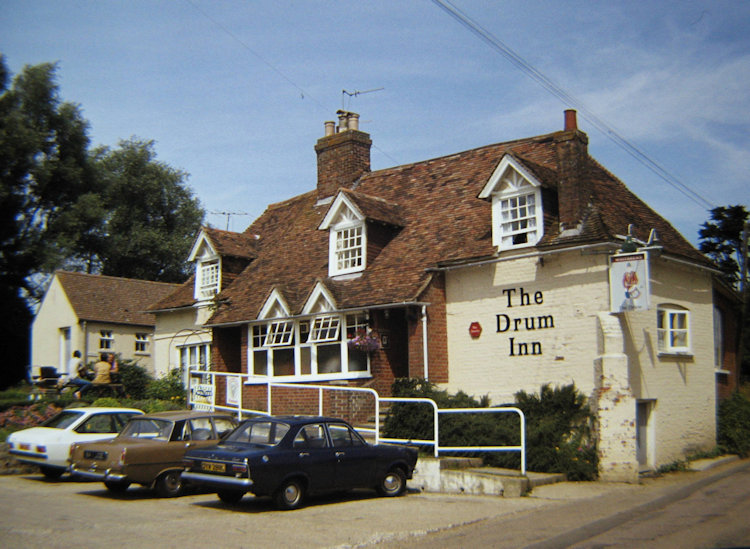
Above photo, 6 August 1979, by Jim Ashby. |
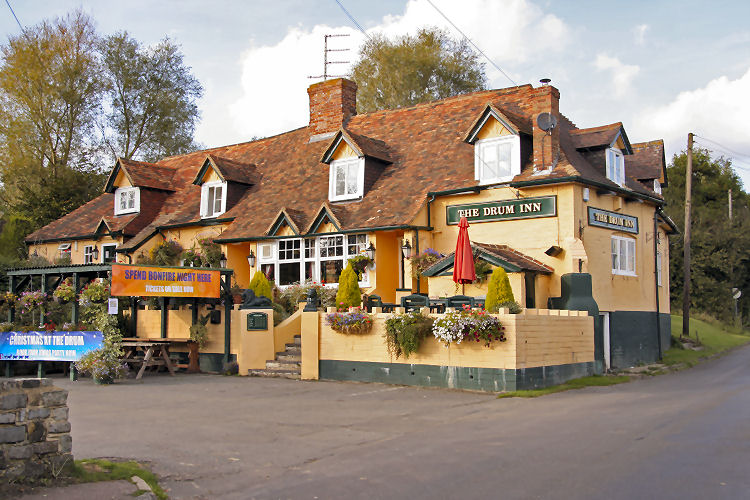
Above photos, 24 October 2007, taken by Eric Hartland. |
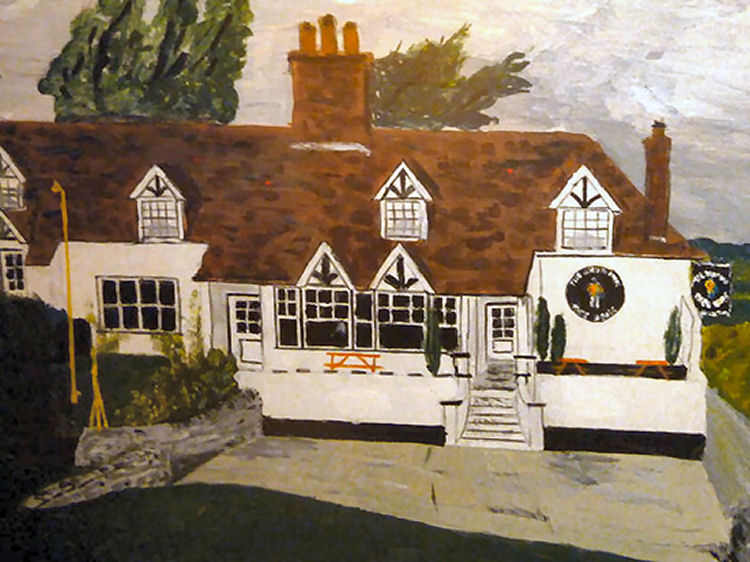
Above painting date unknown. |
Supplied by Alfred Leney Co Ltd, who bought out Thomas Walker's Phoenix
Brewery in 1859 and registered as such in 1896, until bought out by Fremlin
Brothers brewery of Maidstone in 1926, brewing at the Dover brewery ceased
in 1927, which later passed to Whitbread.
|
Following information taken from their website. 2014.
The ‘Drum Inn' was built during the reign of Queen Anne (1702-1714) in
the year 1708 and was originally called ‘Ye Olde Drum.'
It was built at a time when this part of Kent maintained a high level
of military activity and was frequented regularly by the Duke of
Marlborough's regiment, whose uniform colours are depicted in the sign
outside.
In the mid-eighteenth century, the Inn was used as the headquarters
for the recruiting officer who, supported by a small contingency of
soldiers and a ‘drummer boy', would set out daily, making their way
through the neighbouring countryside seeking the enlistment of young men
eager to serve the crown.
In 1760, a fierce battle took place at the foot of Stone Street
between a gang of smugglers and revenue men. The leader of the
smugglers, one Samuel Jackson, shot and killed a revenue officer and
wounded another before being captured and subsequently hanged. Two
members of his gang escaped and took refuge in an old stone barn that
stood where the car park is today.
They were found and flogged in the courtyard to the obvious delight
of the soldiers at the Inn. They were sent to Maidstone to await trial
and eventually they too were hanged.
In the late eighteenth century, Revenue men used the Inn as a
watchtower in their fight against smuggling. It was a common sight in
those days to observe running battles between smugglers and riding
officers along Stone Street.
When the stone barn was pulled down to make way for the car park, a
hoard of treasures were found, including two tubs of contraband gin, a
smuggler's flash, a blunderbuss pistol and the original Inn Sign from
which the colours were used for today's sign. |
|
Kentish Gazette, 1 May, 1804.
DIED.
Died on the 24th inst. at Stanford, much respected, Mr. John Cooper,
master of the "Drum" public house at the above place.
|
|
Kent Gazette Reports 10 May 1805.
A watch, and some gloves and stockings were stolen out of a bed-room
at the "Drum," at Standford, on Thursday last, by some person who
went up stairs and carried off the same unobserved.
|
|
Kent Gazette Reports 10 May 1805.
A watch, and some gloves and stockings were stolen out of a bed-room
at the "Drum," at Standford, on Thursday last, by some person who
went up stairs and carried off the same unobserved.
|
|
From the Kentish Gazette, 19 June 1810.
MARRIED.
June 13, at Lyminge, Mr. John Rigden, of Dover, to Miss Ann Hart,
youngest daughter of Mrs. Cooper, of the "Drum," Standford.
|
|
From the Kent Herald, 1 January 1824.
Death.
Dec. 21, Mrs. Cooper, of the "Drum," Standford, aged 72.
|
|
Kentish Gazette, 25 May 1852.
For Sale.
That Valuable freehold public house, the "Drum Inn," with Butchers shop,
Slaughterhouse, Stables, Granary, Bullock-lodge, all in excellent
repair. With 2 acres of superior pasture land adjoining; situate in the
parish of Stamford; being half a mile north of the Westenhanger Station
of the South Eastern railway.
For further particulars, and to treat for the same, apply to Mr. C
Hammon, the proprietor, on the premises.
|
|
Kentish Gazette, 5 October 1852.
To be sold by private contract.
An old established free public house, in full trade, called the
"Drum," together with about 2 acres of rich meadow land, all
adjoining, situated at Stanford, near the Westenhanger station, on
the South Eastern Railway. In addition to a flourishing
business as publican, carried on by the present proprietor for many
years, he has conducted that other butcher on the same
premises, suitable buildings being erected thereon for the purpose.
To any person competent to conduct the two occupations,
the present offers are rare opportunity for interesting his capital
and Industry. The property is all freehold and immediate
possession maybe had.
For further particulars apply to Mr. James Worsford, Estate Agent,
Dover.
|
|
South Eastern Gazette, Tuesday 8 March 1859.
Accident.
A few nights since, as Mr. Richards, late of the "Drum Inn," Stanford,
Mr. Roalfe, miller, Stanford, and Mr. Dyason, of the "Royal Oak Inn," Newingreen, were proceeding home in a fly from a concert at Sandgate,
the fly came in violent collisions with the corner of the barracks, at
the west end. Both of the hind wheels were broken from the vehicle,
which was also otherwise damaged. The occupants were very much shaken by
the fall, and one was with great difficulty extricated from his
uncomfortable position, but fortunately no serious consequences ensued.
|
|
From the Kentish Gazette, 23 May 1865.
County Petty Sessions, Thursday. (Before Thos. Denne, Esq., the
Rev. Edwin Biron, and Dr. Gidley.)
Transfer of License.
The "Drum Inn," Standford, was transferred to Mr. W. E. Standen.
|
|
Dover Express, Friday 10 May 1895.
Notice.
To graziers, or whoever it may concern. If the sheep left from
exhaustion at the "Drum Inn," Stanford, be not fetched away by Wednesday
noon next, May 15th, it will be sold to pay expenses.
Frank Hart.
|
|
Whitstable Times and Herne Bay Herald, Saturday 7 July 1888.
A Drover Killed Near Elham.
On Tuesday lastly East Kent Coroner (R. M. Mercer, Esq.) held an inquest
at the "Drum Inn," Stanford, on the body of Charles Jarvis Searle,
commonly called "Daisy," or "Chatterbox," aged about 44, a drover,
residing at Canterbury, who was supposed to have met his death by
falling off a colt which he had been engaged to take from Canterbury to
Sellindge.
Mr. Arthur Randall Davis, surgeon, stated that he was summoned by the
police to see the deceased on Sunday last at 3:30. He found him dead. He
(witness) examined him carefully and in his opinion he had not been dead
24 hours. He was bleeding from the left ear and nostril and had a bruise
over his right temple which looked as if it had been caused by falling
on the ground. Death was no doubt called by paralysis, brought on by the
fracture of the base of the skull.
James Adam Searle said he lived at 2, Quay Street, Sittingbourne.
Deceased was his brother, and 44 years of age; he was a single man.
Mr. Harry Long said he sent deceased with a 3 year old horse, which had
no shoes, from Canterbury to Sellindge Court Lodge. He had known the man
for several years. Deceased started about 11; he ought to have been home
between 5 and 6. Next day witness's man discovered that the deceased of
passed the "George." He sent to the police and heard a man had been
found dead, and he found it was deceased. He found the colt in a meadow
at Lyminge. He gave particular instructions to deceased not to ride it.
Deceased was sober when he had the job.
John Stickells said on Saturday at 5 p.m. as he was cutting clover, he
saw a colt come into the field. He caught it, and then went down the
road and saw a man lying by the side of it. He asked him if the horse
was his, but he could not hear what he said. He left him, as he thought
he was drunk.
The jury returned a verdict that death was caused by paralysis from
fracture of the base of the skull, caused by accident.
It appears that the colt was purchased by Mr. Long of Mr. G. Wood, horse
dealer, in Canterbury, on Saturday.
|
|
Folkestone, Hythe, Sandgate & Cheriton Herald 4 September 1915.
LICENSING.
The license of the "Drum Inn," Stanford, was transferred from Mrs. Graham to Mr. W. Harris. The Chairman said it was the desire of the Bench to impress upon all
licensees the necessity for great caution to be observed in serving
soldiers with liquor, and especially soldiers who were in a state of
convalescence at coming out of hospital. The Magistrates hoped all
licensees would be very careful in this matter.
|
|
Folkestone, Hythe, Sandgate & Cheriton Herald, Saturday 23 June 1917.
Elham County Bench. Drum Inn, Stanford.
Mr. G. W. Haines made application for temporary transfer of the licence
of the Drum Inn," Stanford, from Mr. Harris to Mr. F. Clayson. It was
stated that Mr. Harris had already been obliged to leave Stanford on
account of ill health, and Mr. Clayson and had for 9 years held the
licence of the "Rose and Crown, Elham. His intention was to manage the
"Drum" himself and his wife and two sons the manage the "Rose and
Crown."
Superintendent Castle stated that the Chief Constable said he could not
see how both houses could receive proper attention from one licence.
A temporary licence was granted with the suggestion that Mrs. Clayson
should apply to have the "Rose and Crown" licence transferred to
herself.
|
|
Folkestone, Hythe, Sandgate & Cheriton Herald, Saturday 22 October 1921.
Transfers and extensions.
Mr. R. C. Gilbert, of the "Drum Inn," Stanford, was granted an extension
of the licence for one hour on the occasion of the dinner of the
Sellindge Cricket Club.
|
|
Folkestone, Hythe, Sandgate & Cheriton Herald, Saturday 17 December 1932.
Shooting accident at Stanford.
Licencee's Right Hand Amputated.
Mr. W. J. Percival, Of the "Drum Inn," Stanford, received serious
injuries to his right forearm on Thursday afternoon when his gun
accidentally discharged as he was getting over a hedge whilst he was a
shooting with two friends. The shot entered Mr. Percival's right wrist.
After first aid of been rendered by P.C. Green and a lady, he was
conveyed to the Royal Victoria Hospital, where it was necessary to
amputate his right hand on Thursday evening.
On enquiry yesterday (Friday) the Herald was informed that Mr. Percival
was making satisfactory progress.
|
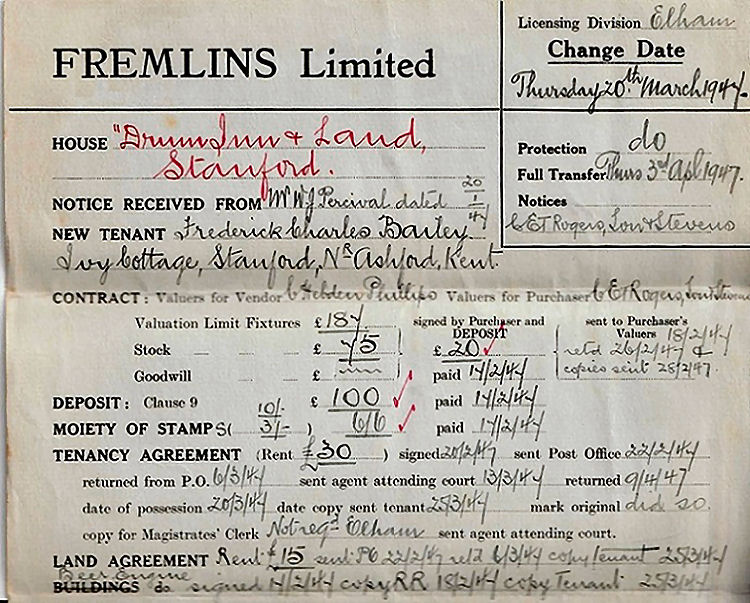
Above document showing the change of licensee in 1947.
|
|
East Kent Gazette, Friday 5 November 1948.
Public House Fire.
The 250 year old "Drum Inn," at Stamford, near Ashford, was damaged
by fire on Friday last when bursting
bottles wakened the licensee, Mr Frederick Charles Bailey. Mr.
Bailey found flames creeping around an oak
beam in a bath ceiling. Firemen found the beam have been smouldering
for several days.
|
I have heard rumour (2017) that the pub is under threat of demolition to make
way for a lorry park.
LICENSEE LIST
COOPER John to 24/Apr/1804 dec'd
COOPER Mrs 1804-24+
HAMMON Charles 1847-52+
 (butcher & victualler age 57 in 1851
(butcher & victualler age 57 in 1851 ) )
HANLEY Henry A 1861+ (age 49 in 1861 ) )
RICHARDS Mr pre 1859
STANDEN W E Mr May/1865+
WANSTALL George 1871+ (also baker age 58 in 1871 ) )
FORSTER Samuel George 1881+ (age 60 in 1881 ) )
HART Frank 1895+
GRAHAM William Earl Storey 1899-Sept/1915 (age 59 in 1901 ) )
 
HARRIS W Mr Sept/1915-June/17
 CLAYSON F Mr June/1917+
CLAYSON F Mr June/1917+
GILBERT R C Mr 1921+
PERCIVAL William John 1932-20/Mar/47

BAILEY Frederick Charles 20/Mar/1947+
 From
Bagshaw Directory 1847 From
Bagshaw Directory 1847
 From
the Kelly's Directory 1899 From
the Kelly's Directory 1899
 From the Kelly's Directory 1903 From the Kelly's Directory 1903
 From
the Kelly's Directory 1934 From
the Kelly's Directory 1934
 Census Census
|
Just to prove that we don't always get things right, but that kind
people help us with errors which I most certainly welcome, Robin Emdon
kindly pointed out that the photo below, which we thought was of the
above pub is actually one in Cockington, Torquay.
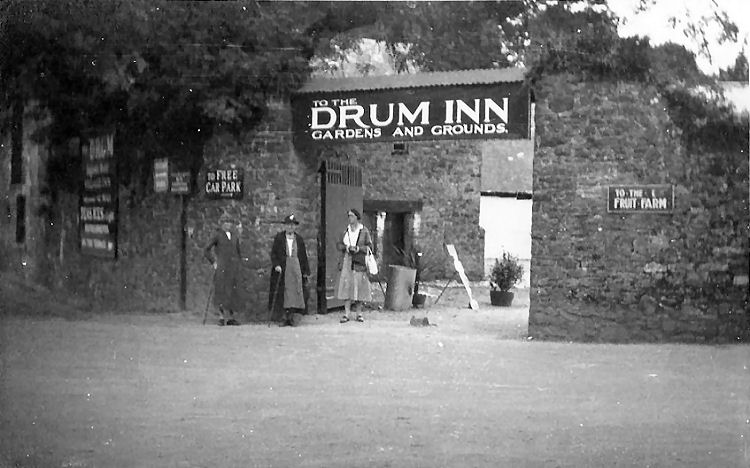
Above postcard, circa 1930, kindly sent by Rory Kehoe. |
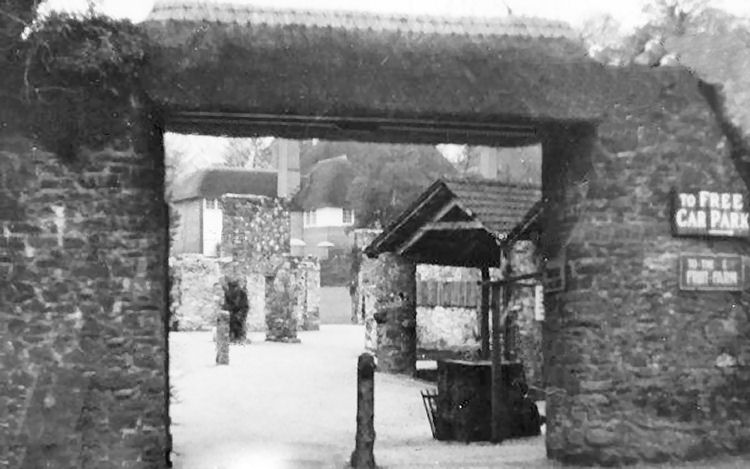
Above photo showing the entrance to the pub in Cockington, circa 1950. |
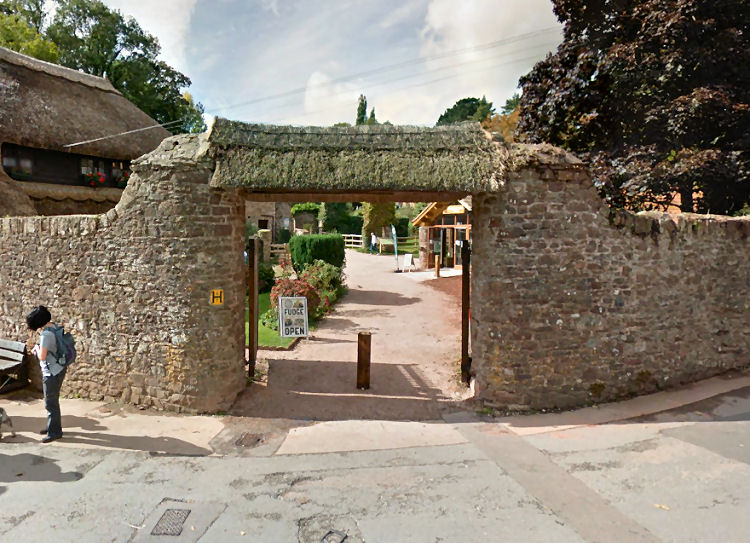
Above Google image, September 2016. |
|









